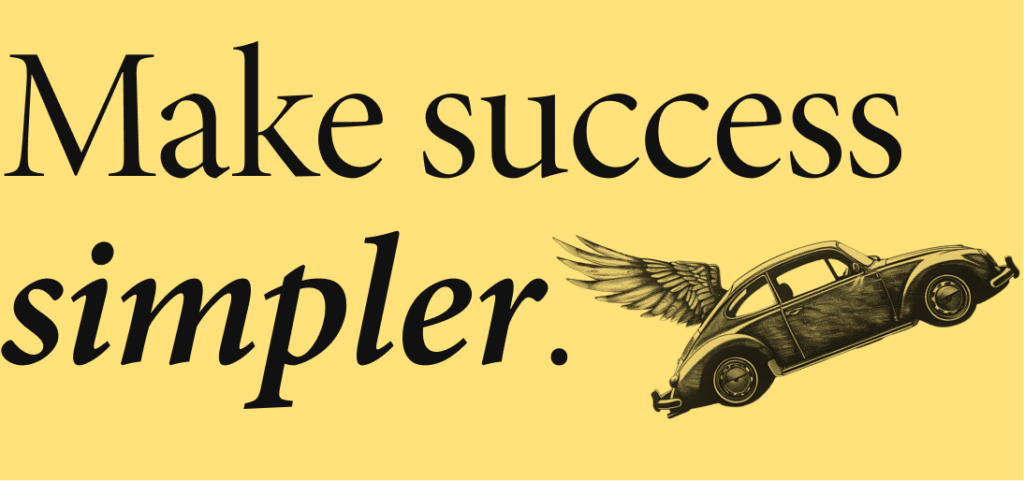Welcome to One Thing Better. Each week, the editor in chief of Entrepreneur magazine (that’s me) shares one way to be more successful and satisfied — and build a career or company you love.
If this email is useful to you, please share it with others!
Today’s one thing: Being perfect.
That one thing, better: Being real.

I just bombed for the first time in my professional career. Like, truly bombed.
It happened last week. I was speaking at a conference in Las Vegas, telling a story I’ve told hundreds of times. Then something went wrong. My mind scrambled. I couldn’t recover. I stammered. Struggled.
Hundreds of people watched. It was excruciating and embarrassing and alarming.
But here’s the truly shocking part: It wasn’t a disaster.
People were happy. Grateful, even. They thanked me.
Today, I want to tell you what happened. Because the next time I lose control, this is the insight I’ll rely upon to get me through.
And I know it can help you too.
Here’s what happened.

I’m in a Vegas conference room, about to be the keynote at Valuation Expo. Before I go on stage, a guy introduces himself to me and says, “I’ll be your time-keeper — so I’ll flash you cards when you have 10 and then 5 minutes left.”
I say thanks. I’m not worried about the time. I’ve been hired to give a 30-minute talk, and I know how to do exactly that.
Then I’m introduced. I hit the stage and feel good. The crowd is engaged. I’m full of energy. I do my opening, then am halfway through my first section when…
The time-keeper flashes me a “10”.
That can’t be right, I think to myself. Maybe he means I’ve been on for 10 minutes?
It’s confusing, but I try to put it out of my mind. I wrap up the first section of my talk and start the second.
Then the time-keeper flashes me a “5”.
Now I’m very confused. Clearly he means I have 5 minutes left. But how is that possible? I know how long my talk takes — and I should have about 18 minutes left. But if there are 5 minutes left, that means I’ve been talking for 25 minutes. My mind starts to spin. Where did the time go? Did I just ramble for 25 minutes? Is something wrong? And what do I do now? How do I wrap up in 5 minutes?
As I’m wondering this, I’m also trying to keep my talk going. I was in the middle of a fun story about a beer company, but now my brain is overwhelmed. I start to lose control. Words become harder.
I’ve experienced a lot of problems on stage, and pride myself on navigating them. I’ve had tech failures. Loud noises. Disruptive audience members. I know how to handle it with grace and humor. But the problem has never been me. And I have no playbook for this.
I stop. I apologize to the audience. I try to keep going, but can’t find my mental footing. I stop again. An attendee tries to be helpful, reminding me of the last words I said. I try again. I just… cannot… do it…
Then I realize something important:
I’m trying to finish my story, and the crowd is nervously rooting for me to get through it — which means the story is no longer the point.
So I fling my clicker onto a nearby chair and I say: “You know what? Fuck it.”
The crowd laughs and claps. The whole room relaxes.
I tell the crowd that I’m exhausted. It’s true. I’d slept poorly the night before, woken up early, flown from New York to Vegas, and hit the stage at 4:30 PST — which is 7:30 pm for my body. It’s been a long day.
Then I try telling them some other things. My brain is in knots. My body is a mix of adrenaline and panic. I’m only half as coherent as I wished. But I try.
I tell them that I’ve seen this happen to other speakers. I tell them that this is scary. I attempt to give some advice about maintaining control in difficult situations, and how every mistake is an opportunity to learn. I apologize. I make a few jokes. I thank them for being so understanding. Then I get off stage, defeated.
That’s when I get clarity.
First, the time-keeper runs over to apologize. He is so nice. And he explains what happened.
I was supposed to go on stage at 4:30, and his job was to get me off stage at 5. But the previous session went long and the sound guys had to fix something, so I didn’t get going until maybe 4:43. The time-keeper wasn’t sure what to do, so he stuck to his original orders — have me wrap up by 5.
This is why his cues were off. Instead of pacing me for a 30-minute talk, he was pacing me for a 17-minute talk — but I had no idea.
I don’t blame him. I could have paused and asked for clarification — which would have been awkward, sure, but it would have saved the day. I was on stage. I was in charge. It’s a great lesson for next time.
Then attendees start approaching me. They tell me their own stories of blanking out.
“It made me feel better about myself, knowing that you’re not perfect,” one said.
“That was the most real thing I saw today,” another said.
Then I learn that nobody is upset. The event organizers, my dear friends Hal and Kim, thought I handled it well. (It also taught them a good lesson, they said: Next year, they’re hiring a showrunner to avoid these kinds of miscommunications.) The sponsor, who paid specifically to cover my speaking fee, was also happy — they think my talk was positive and memorable. (Thank you, ServiceLink!)
My brain starts to clear. I am relieved. But still, something nags at me…
New to this newsletter? Subscribe!
What could I have done better?
I struggle to fall asleep that night. I keep replaying the situation in my head, and wonder: What else could I have done on stage, after my talk fell apart? How could I have made it more powerful? More memorable?
I start conjuring scenarios — or what psychologists call counterfactual thinking. I settle on an alternate reality: I should have asked everyone to raise their hand if they’ve messed up in a big moment, then had them look around to recognize how universal this experience is, and then I would share some big, powerful lesson.
I can’t get this idea out of my head. I’m so regretful. I need perspective.
I record a voice memo for my friend Katherine Morgan Schafler, who’s a brilliant psychotherapist. I explain what happened, how I handled it, how I’m now stuck imagining all these better ways of handling the moment, and this idea I had for having everyone raise their hand, etc etc etc.
Speaking aloud is so helpful. It’s like taking ideas out of your head and putting them on a shelf, where they can be dealt with later.
I text Katherine my voice memo. I fall asleep. When I wake up, I have her response.
She says she loves everything I did — except for my fantasy about how I could have handled the moment better. “You’re looking for a ‘perfect’ version of this,” she says, “but your ‘perfect’ version is much less powerful than what ended up happening.”
Then she says: “Your version of ‘perfect’ is a version where you don’t trust the audience to figure out what everyone in that room knew, and now gets to remember — which is that we all get scrambled, and we all have a choice to make about how we recover. And the speed and efficiency with which we recover isn’t the thing that matters. What matters is that people see us trying, people see us making mistakes, and people see us making reparative measures. The reparative measure is what matters, not whether the reparative measure is immediately efficient.”
This was exactly what I needed. In other words: Don’t measure yourself by how quickly or impressively you recover. Measure yourself by your effort and intentions. That’s what’s controllable, and it’s what people will see and remember.
When I get home, I tell my wife Jen this story. She has a great perspective too.
“You went to give people a helpful message,” she said. “What happened wasn’t the message you intended to give, but it was an important message anyway. And they’ll remember it.”
It’s all true.
This happened last Tuesday. I’ve been getting messages from attendees ever since.
One person wrote me: “Earlier today, I was shaking just to stand up and ask a question of a panel in front of my peers, like a fragile child. You were a rockstar. You helped to raise the tide of intelligent, aspirational, motivated thinkers at a time when our profession is being shaken to the core.”
Another wrote: “I know you felt like you bombed and lost track of your story BUT literally you were the best speaker by far and I loved how authentic you were, even with your frazzleness.”
These messages mean the world to me.
But now I also understand what motivates them.
You’re not measured against perfection. You’re measured against something deeper, more human, more realistic, and more lasting. So in difficult moments, move towards that thing. Don’t worry about whether you do it well, or quickly, or beautifully. Just worry about doing it.
That’s how to do one thing better.
